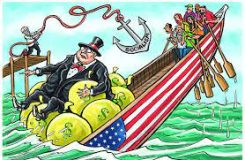Contents
When our article on liberalism attracted a lot of attention, it was necessary to write about capitalism as well in order to eliminate the confusion. However, we must underline from the beginning that while liberalism is a system of thought and a philosophy, capital movement is its complementary economic system. Generally, it is easy to portray that system as the bogeyman and to stand aside by saying that it is the cause of all evil. Those who say this should also say to what we owe all these blessings if there are smart phones and technological inventions today. On the other you should learn about communism and imperialism also in order to understand the subject.
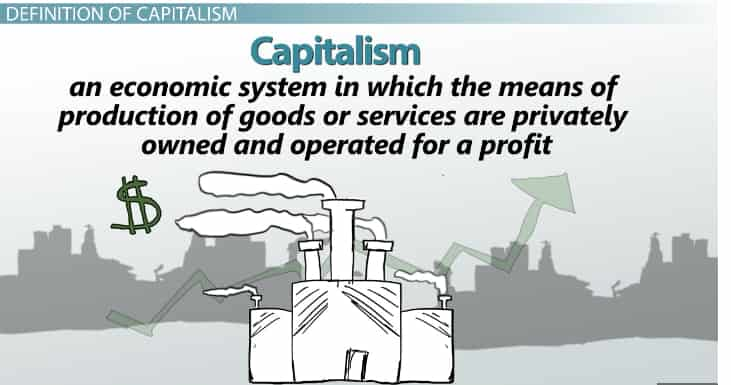
In addition of that it should not be a coincidence that the countries that use this system are the richest and most successful countries in the world. In other words, we remember the periods when campaigns such as “buy five and pay four” or “whatever you buy for one dollar” trigger always our appetite for consumption when even we do not need it at all. Frankly, we like to insult it by saying “this is capitalism!” After making a complex and short introduction to the subject, we will touch on the definitions and historical flow about that economic system without going into too much detail and without getting bogged down in details.
As a result, we need to have knowledge about the dominant economic system in the world in terms of personal development and career management.
What is Capitalism? A Short and Basic Overview
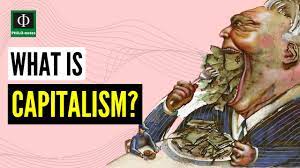
This system, known as pro-capital, actually simply means the system of capital and money. Although the history of capitalism actually goes back to the invention of money, the existence and strengthening of this system is based on the formation of mass production and capital accumulation after the industrial revolution. At that time, agricultural capitalism was mostly popular about due to the existence of landowners in the feudal system. At this point, with the invention of the steam engine and the introduction of mass production in England at 1880s, the peasant population migrated to the city and a new system emerged.
In fact, in this classical system, also called industrial capitalist movement, workers worked for a certain wage and provided income for the capital owner. From this perspective, it is classically means ownership of the means of production by private property or individuals. On the contrary, if the means of production are in the hands of the state, it is called communism, but such a system does not currently exist in the world.
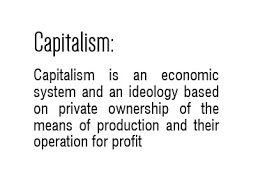
Adam Smith put forward the view that if each individual strives to maximize his own interest, the total benefit of individuals maximizes the benefit of society in that period. After this view, capitalism was now well established. In other words, the basis of this system was the individual and freedoms. The individual, who finds a place for himself as an “entrepreneur” in its principles, is at the centre of this system. Just as the free individual is at the centre of liberalism, the basis of that economic which is the economic system of liberalism, is “the maximum economic benefit of the individual.”
Capitalism and Wealth
As we will shortly state in the principles, in an environment where private property exists, the individual strives for more and tries to maximize his benefit by consuming more. In this context, the duty of the state is to provide security and legal regulations to ensure the economic environment in which the individual will increase his benefits.
It should not be forgotten that the richest countries in the world are governed by this system and all the technological inventions that make our lives easier today come from these countries.
Now let’s briefly talk about the basic principles of this system.
Features of Capitalism: Free Markets, Competition, and Innovation
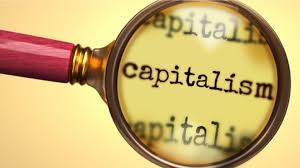
We will briefly touch upon the basic principles of capitalism which is based on the economic welfare of free people. Our aim here is to quickly understand these principles and understand the purpose of this economic system, rather than making a deep capitalist philosophy.
– Private Property: The basis of capitalist system is private property. Individuals with private property will always strive for more. In this situation, which creates a consumption-based society, the individual aims to increase his wealth. Conversely, in an environment where there is social ownership and everything belongs to everyone, individuals will probably not fight for the better.
– Free Market: Almost all of the classical economists, starting from Adam Smith, have an “invisible hand” and the principle of a free market that is automatically regulated by this hand. In other words, for any product or commodity the market will always come to balance between the buyer and seller at the price determined by supply and demand. The seller is free to set the price he wants and the buyer is free to buy the product at the price he wants. The intervention of the state or any external power in the market will disrupt this balance and subsequently social economic welfare.
– Perfect competition: There is no place for monopoly or oligopolistic markets in the capitalist system. In other words, the state or authority should make regulations that will ensure the creation of a multi-seller environment. In line with this there will be competition in an environment with many sellers, and competition will bring quality and social welfare.
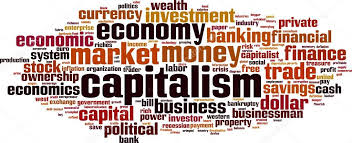
Capital and Inheritance
– Capital Accumulation: Capital is indispensable in capitalist thought system. Because capital is what brings the profit that will keep the wheels turning. When we look at the rich countries in the world, we see that they were countries that had sufficient capital accumulation before switching to the capitalist system.
– Right to Inheritance: One of the most important institutions in capitalist thought is the right to inheritance. So, if you do not have the right to inherit and the things that belong to you pass to the state upon your death, you will have no motivation to work for more than you need. In this context, we should point out that after a certain age, everyone explains the reason for their fight for more as “for the future of our children“. After all, the right to inheritance is a special right sanctified by the capitalist system which complements the right to private property.
The Origins of Capitalism: How It Emerged and Evolved

In order to understand today’s financial capitalism, we need to go back to the 16th century and briefly look at feudalism, agricultural capitalist movement and mercantilism. It should be noted that between the 15th and 18th centuries, two separate systems called agricultural capital system and mercantilism prevailed respectively. In those periods, land and naturally capital accumulation belonged to the landowners, and peasants worked alongside the landowners as workers. Mercantilism is a system that increases exports and ensures that gold and income remain within the country’s borders through industrialization. According to them, the total wealth of the world is certain and it is not possible to increase it.
Therefore, the more gold and capital a country keeps within its own country, the richer it will become. Of course, this idea was accepted to a certain extent in the period when there was no technology and productivity increase. On the other hand, the group we call classical economists, the most famous of which is Adam Smith, argued in the 1800s that the total wealth in the world could be increased with productivity increases, technology and international workforce. In other words, they opposed mercantilist views and time proved them right. Later, with the invention of the steam engine and the development of mass production opportunities in England, protectionist and mercantilist policies began to lose their importance.
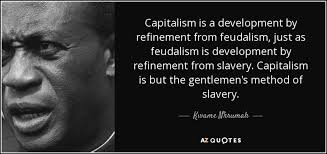
In addition, with the opening of large factories and migration from villages to cities, the power of the feudal landlords was further weakened. So, it was obvious that a new production system was emerging and burying the old ones. In other words, with the birth of industrial capitalism, both protective mercantilism and the feudal land system based on agricultural capitalism were disappearing. Industrial capital system continued to grow and develop until the early 1900s.
Social Order in Liberal Thoughts
By the way, experiencing harsh and serious crises such as the 1929 Depression led to criticism. If we take a brief look at the history of that system, we see that as the degree of freedom of the system increases, it produces crises in certain periods.
This means that the type of capitalist movement, also called social capitalism, which includes minimum wages, union rights and social payments, is much more suitable than classical type of it. In this type of system, state interventions are minimal and efforts are made to minimize the system’s crisis production.
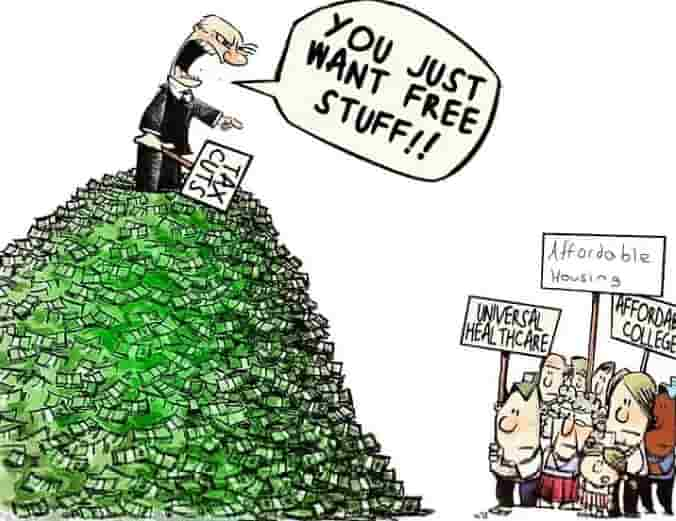
Capitalist Thought in 21st Century: Challenges and Future Trends
The dominant government system in the world today is liberal democracy, and its economic system is capitalism. In addition, we must state that when we look at capitalist countries around the world, we see very different practices. In other words, American capitalism is not the same system as that system practiced in China, South Korea or Russia. Each country has adapted this system according to its own dynamics and tried to achieve the national welfare it desires. After stating this, it is necessary to touch upon the very controversial relationship between religion and capital. As we stated before, capitalist management is an economic system. The perspective of this economic system on religion is secularism.
In other words, liberal democracy and capitalist movement approach every religion with equal distance. In this sense, people’s beliefs are excluded by the system and people are evaluated only as economic individuals. For example, in Japan, America or Canada, which has different beliefs, liberal democracy and capital system operate independently of the beliefs of these countries. On the other hand, it should be noted again that the capitalist system produces crises when it is given excessive freedom for the purpose of high profits. As we move from industrial capitalism to financial type of it, preventing crises such as the 2008 financial crisis that affected the whole world, arising from sub-prime housing loans, will only be possible in a social capitalist thought.
Finally, it should be noted that for a healthy capitalist system to function, the liberal system must also function effectively. In other words, the functioning of democratic institutions and rules of the liberal system, such as the rule of law, independence of the judiciary, freedom of expression and holding free elections are also very important indicators for that system.
